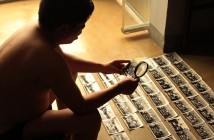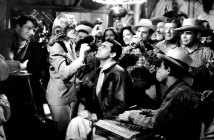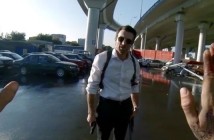
Editor’s Note: The following review is part of our coverage of TIFF’s film series The Wind Will Carry Us: The Films of Abbas Kiarostami. For more information, visit tiff.net and follow TIFF on Twitter at @TIFF_NET.
At first, the film seems one of a complicated subject: Mr. Badii (Homayon Ershadi) drives around Tehran looking for someone who will bury him after he commits suicide. He doesn’t come right out and say it, but tells candidates there is big money in this small job. Not at any time of the film are we given his motivations for killing himself. It’s all in his eyes, suppositions, and his gestures.
Isolation is an integral theme for this film, since Mr. Badii finds no sense in living in the world.
I find Abbas Kiarostami films to be as basic as possible in setting, that is, he lets the environment play out as naturally as possible. For example, at the beginning of the Taste Of Cherry, Mr. Badii drives through a main road, bustling and congested with people looking for work or in transit. The only soundtrack you hear (and for the rest of the film), is of the drone of the car or world outside. Sky and road change into a more rural area of hills, construction, and dirt roads where smiling kids play in abandoned cars. Obviously Mr. Badii is searching for something, but at the time viewers are unaware.
What I take from these scenes is a thought out journey replete with feelings of desolation even when it is crowded with people. And yet, everyone in this film has a story that leads to individual reasoned responses to Mr. Badii’s proposition. One of the candidates is a soldier who although could use the money, is scared of doing something against the law.
 Isolation is an integral theme for this film, since Mr. Badii finds no sense in living in the world. A few even mention to him the joys that can still be found in the world: the sunset, the taste of fruit, and the laughter of children. For a few seconds there is a glimmer, even a moment where Mr. Badii runs back to say something to the person who’s finally agreed to his suicide plan. These little moments can only be captured by the look on the actor’s faces placed in a space in time where the continual rush of life goes in sharp contrast with the Mr. Badii’s desired finality.
Isolation is an integral theme for this film, since Mr. Badii finds no sense in living in the world. A few even mention to him the joys that can still be found in the world: the sunset, the taste of fruit, and the laughter of children. For a few seconds there is a glimmer, even a moment where Mr. Badii runs back to say something to the person who’s finally agreed to his suicide plan. These little moments can only be captured by the look on the actor’s faces placed in a space in time where the continual rush of life goes in sharp contrast with the Mr. Badii’s desired finality.
Reading back at reactions from the film, it scored the Palme d’Or at the 1997 Cannes Film Festival, many extolled a masterpiece while few just felt it was too simple and boring. Taste of Cherry is not a long film and there is little in the way of action or drama. It’s just a guy who wants to kill himself and seeks someone to obliterate the sight of his dead body. The plot alone is poetic to think of a man who, as far the audience knows, has no earthly detachments, has possibly made some decisions he regrets, and wishes release himself from this mortal coil anonymously. The only concern we find within him for others, specifically the candidates, is where they come from, why they are who they are, and if they are happy with their lives. The constraint here is that the protagonist is a universe in himself. Everyone he encounters, whether they divulge little or a lot, have entire lifetimes and worlds that they represent. The city of Tehran is seen from the inside and from the hills. Always moving and when you think about it, Mr. Badii traverses the city and its surroundings circularly, like on an orbit. Mr. Badii picks a hole a by solitary tree to be buried in. The tree overlooks the sunset huge among the horizon of the city. He’s chosen to die among the stars of the world that surrounds him, to be become part of the (cosmic) dust that’s unsettled by the transit, the construction, and the children of the city.
The constraint here is that the protagonist is a universe in himself. Everyone he encounters, whether they divulge little or a lot, have entire lifetimes and worlds that they represent.
At the end, the film pans back exposing the fourth wall revealing the camera, director, and actors of the film. This scene reminds me of Federico Fellini’s And The Ship Sails On, where the camera pans back on one of the most surreal scenes in film (old man rowing a boat with a rhinoceros), and shows the director behind the camera and reveals cinematic conceits. It made me question Kiarostami’s motivations with the film. Was he forcing the audience into a narrative he was already unsure of? Is he making the audience posit their own stories into the film?
Any movie that posits questions like that is a piece of art worthy of the watch and re-watch and re-think.
Abbas Kiarostami's Taste of Cherry is gentle and artful meditation on life and death which posits some difficult questions for the viewer.



